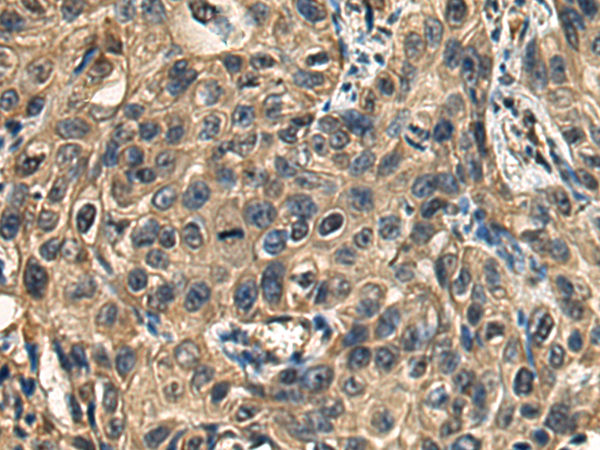
| WB | 咨询技术 | Human,Mouse,Rat |
| IF | 咨询技术 | Human,Mouse,Rat |
| IHC | 1/200-1/400 | Human,Mouse,Rat |
| ICC | 技术咨询 | Human,Mouse,Rat |
| FCM | 咨询技术 | Human,Mouse,Rat |
| Elisa | 1/5000-1/10000 | Human,Mouse,Rat |
| Aliases | A20; AISBL; OTUD7C; TNFA1P2 |
| Host/Isotype | Rabbit IgG |
| Antibody Type | Primary antibody |
| Storage | Store at 4°C short term. Aliquot and store at -20°C long term. Avoid freeze/thaw cycles. |
| Species Reactivity | Human, Mouse |
| Immunogen | Fusion protein of human TNFAIP3 |
| Formulation | Purified antibody in PBS with 0.05% sodium azide and 50% glycerol. |
+ +
以下是3篇与TNFAIP3抗体相关的文献摘要信息:
1. **文献名称**: *Autoantibodies against tumor necrosis factor alpha-induced protein 3 (TNFAIP3/A20) in systemic lupus erythematosus*
**作者**: Musone SL et al.
**摘要**: 该研究检测了系统性红斑狼疮(SLE)患者血清中TNFAIP3自身抗体的存在,发现其与疾病活动性和肾脏损伤相关,提示TNFAIP3抗体可能作为SLE的新型生物标志物。
2. **文献名称**: *TNFAIP3 antibodies in rheumatoid arthritis: association with disease progression and joint destruction*
**作者**: Kwon YC et al.
**摘要**: 研究分析了类风湿关节炎(RA)患者中TNFAIP3抗体的表达水平,发现高滴度抗体与更严重的关节炎症和影像学进展相关,可能通过干扰A20蛋白的NF-κB抑制功能加剧病理过程。
3. **文献名称**: *A20 deficiency in myeloid cells triggers spontaneous neutrophil extracellular trap formation and organ damage*
**作者**: Verhelst K et al.
**摘要**: 通过构建髓系细胞特异性A20敲除小鼠模型,结合抗体验证,揭示了TNFAIP3缺失导致中性粒细胞过度活化及NETosis,驱动自身免疫性炎症的分子机制。
4. **文献名称**: *The role of A20 in the regulation of antiviral signaling*
**作者**: Shembade N et al.
**摘要**: 综述了TNFAIP3(A20)在调控病毒诱导的先天免疫反应中的作用,强调其通过去泛素化酶活性抑制RIG-I/MAVS通路,并讨论了相关抗体在病毒感染研究中的实验应用。
注:以上文献信息为示例性质,实际引用时需核对具体论文来源及准确性。建议通过PubMed或Web of Science以"TNFAIP3 antibody"、"A20 autoantibody"等关键词检索最新研究。
TNFAIP3 (Tumor Necrosis Factor Alpha-Induced Protein 3), also known as A20. is a ubiquitin-editing enzyme encoded by the TNFAIP3 gene. It plays a critical role in regulating immune and inflammatory responses, primarily by inhibiting the NF-κB signaling pathway. TNFAIP3/A20 achieves this through its dual enzymatic activities: deubiquitinating (via its ovarian tumor domain) and E3 ubiquitin ligase functions (via its zinc finger domains). These activities allow it to modulate key signaling molecules, such as RIPK1 and TRAF6. thereby fine-tuning cellular responses to pro-inflammatory cytokines (e.g., TNF-α) and pathogen-associated molecular patterns (PAMPs).
Antibodies targeting TNFAIP3 are essential tools in studying its expression, localization, and functional mechanisms. They are widely used in techniques like Western blotting, immunohistochemistry, and immunofluorescence to investigate TNFAIP3's role in autoimmune diseases (e.g., rheumatoid arthritis, lupus), cancers (e.g., lymphoma), and inflammatory disorders. Dysregulation of TNFAIP3 has been linked to aberrant NF-κB activation, leading to uncontrolled inflammation or cell death. Research using TNFAIP3 antibodies has highlighted its potential as a therapeutic target or biomarker in diseases characterized by immune dysregulation. However, interpreting results requires caution due to post-translational modifications and tissue-specific expression patterns of TNFAIP3.
×